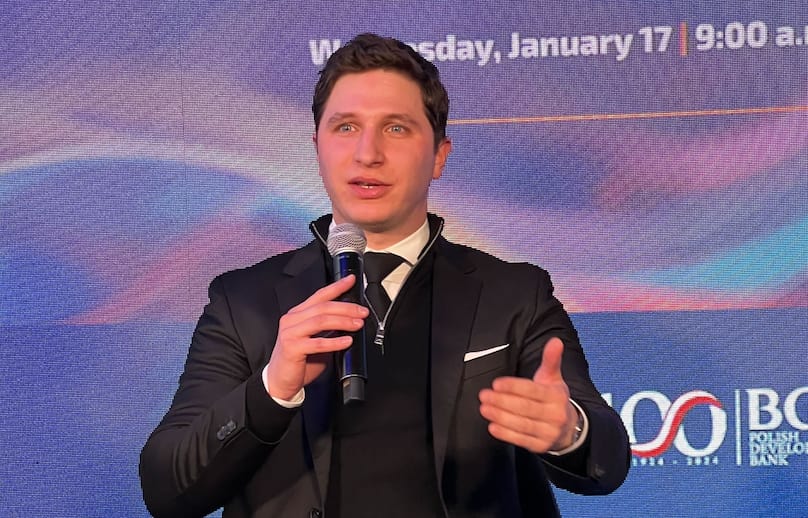Satellite tech a game-changer for parametric insurance: ICEYE CEO at Davos

Speaking at the World Economic Forum event in Davos, Switzerland this week, Rafal Modrzewski, CEO and Co-Founder of ICEYE explained the important role satellite technology and the data it can collect has for the global insurance and reinsurance market, as well as societal resilience.
In particular, Modrzewski highlighted parametric insurance as an opportunity that can both expand the delivery of insurance capital, while enhancing resilience and assisting government response to natural perils.
Earth observation data has been in use for parametric insurance for well over a decade, but the sophistication of the satellite data stack and the sensors available, as well as the fact satellites are smaller, lighter, cheaper and easier to deploy than ever before, has led to a proliferation of data becoming available, at ever faster speeds.
ICEYE has become one of the leaders in this space, with a growing constellation of advanced satellites and its data already being utilised in parametric insurance and risk transfer, as well as more widely in this industry as a way to get real-time data on natural hazards as they occur.
Speaking about the global challenges faced by populations around the world during a panel discussion at the Davos event, ICEYE CEO Modrzewski explained that, when it comes to one of the biggest threats, climate change, “Technology plays a role in helping governments and organizations address the landscape of global risk management.”
“The collective actions that individuals, organizations, and global leaders take together can help move the needle toward reducing global risks and making the transition successful. By coming together to have meaningful conversations like those at Davos, we can better address these issues to construct a resilient future,” he explained.
He went on to explain how satellites and ICEYE’s offering can help.
“The ability to see any location on Earth quickly and reliably greatly enhances information gathering. In a world where anything and nothing can be true because of the sheer volume of information that can be generated, making decisions based on what you can actually agree on – what is actually happening on the ground – becomes paramount,” he said.
Continuing to explain that, “SAR satellite technology is a game-changer that has a meaningful impact on humanity. Its advancements enable us to track changes and patterns on our planet — empowering decision-makers to predict the activities of natural disasters slightly into the future. These insights are invaluable for governments and insurance companies to respond rapidly and accurately with hazard data that consistently close the gap.”
Importantly, for the governmental and public sectors, Modrzewski told the audience, “Earth Observation enhances the ability of governments and organizations to respond to societal challenges and disruptive events, from natural disasters such as floods, wildfires, and tsunamis to national security challenges, deforestation, and marine preservation.
“Access to these resources provides essential insights that governments and organizations need to manage global risk and make informed decisions. SAR imagery can be taken regardless of weather conditions, allowing decision-makers to understand the level of damage and full-scale impact at any time.”
Modrzewski believes that satellite technology is a game-changer for the response to growing natural perils around the world.
“The game changer is simple: you can finally monitor high-risk events before, during, and after they happen. The speed of the response is determined by the pace at which the data is collected,” he explained.
Adding, “ICEYE’s capability to provide near real-time situational awareness as a disaster unfolds significantly advances the response mechanisms of governments and insurance companies. This immediate awareness allows swift, decisive actions that enhance the outcomes for those most impacted by disasters.”
He went on to highlight the need for greater public-private partnerships to address disaster and climate risks, an area ICEYE is already involved.
“The rapidly intensifying impact of climate-related perils such as floods and wildfires is driving a need for greater collaboration between the public and private sectors. ICEYE is critical in supporting public-private partnerships that reduce the protection gap and deliver innovative insurance or assistance to at-risk uninsured populations by providing crucial geospatial data in near real-time.
“This timely data delivery, available before, during, and after major flood or wildfire incidents worldwide, addresses a significant information gap. This gap has previously hindered the effectiveness of solutions like parametric insurance, which relies on prompt and efficient coverage for at-risk communities,” Modrzewski said.
He then highlighted that, “Parametric insurance solutions depend heavily on data, with specific thresholds set as triggers for immediate payouts following a disaster. Data acquisition accuracy, consistency, and speed are vital for these triggers. ICEYE’s satellite constellation, complemented by ground-source data, offers high-resolution insights, often within 24 hours of a disaster’s peak impact. This rapid and reliable data delivery is crucial for realizing the full potential of parametric insurance.”
Closing by saying, “Groundbreaking innovation in this space will help address the complexities of these challenges and build global resilience faster and more accurately than ever before.”






